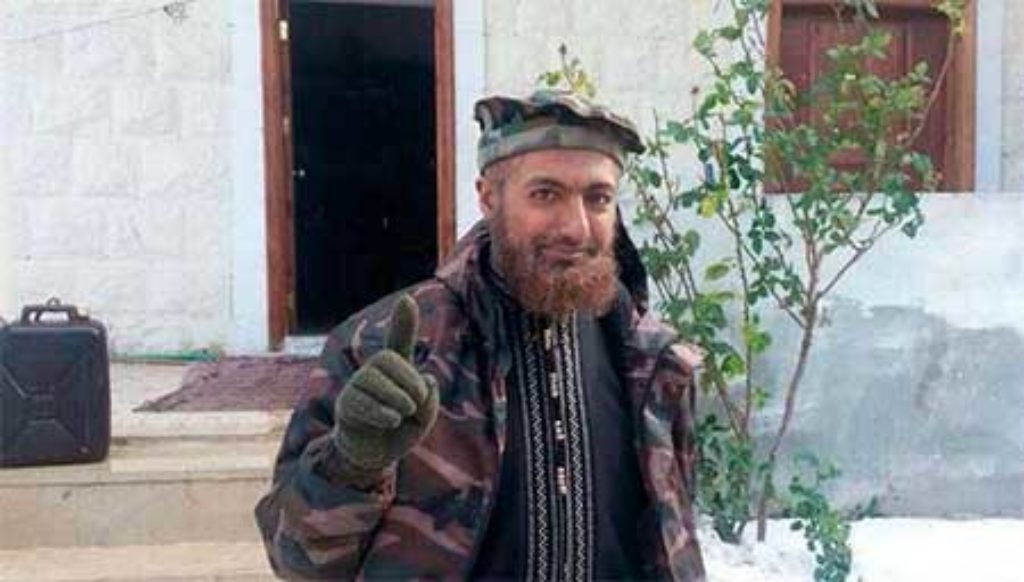
Ibrahim bin Shakran, former Guantanamo Bay detainee, and co-founder of Harakat Sham al Islam
Harakat Sham al Islam, a jihadist group founded by and primarily comprised of Moroccans, has announced its merger with the local Syrian jihadist faction Harakat Fajr al Sham al Islamiyya. The two groups previously operated as part of the al Qaeda-linked alliance Jabhat Ansar al Din.
According to a statement released on Twitter on Dec. 10, the two groups have merged under the Jabhat Ansar al Din name with a “total integration” of forces headed by former Harakat Fajr al Sham al Islamiyya leader Dr. Abu Abdullah al Shami.
It goes on to read that “this blessed move comes at a desperate time in the Syrian Revolution and its blessed jihad to close the ranks, unite, and gather efforts.” This move reportedly came after “listening to the scholars and reformers on the need for unity” to protect the jihad in Syria. “Scholars and reformers” is a reference to the line peddled by al Qaeda officials for its efforts in Syria. The “need for unity” is one of the main reasons behind the Al Nusrah Front’s re-branding into Jabhat Fateh al Sham, along with many other smaller bands.
Ayman al Zawahiri, the overall leader of al Qaeda, and his deputies have long stressed the need for jihadist unity. Before Nusrah’s rebranding, Zawahiri’s deputy, Abu Khayr al Masri, released a message blessing the re-branding to unify the ranks and “preserve the jihad” in Syria. Abu Muhammad al Jolani, the leader of al Qaeda’s branch in Syria, spoke in a similar tune in an interview to Al Jazeera in Dec. 2015. [See FDD’s Long War Journal report, Analysis: Al Nusrah Front rebrands itself as Jabhat Fath Al Sham.]
Harakat Sham al Islam
Harakat Sham al Islam was founded in 2013 by Ibrahim bin Shakran, Ahmed Mizouz, and Mohammed Alami, three Moroccans who were captured in Afghanistan after the US invasion in 2001, detained at Guantanamo Bay, and then released to the custody of the Moroccan government in 2004 and later released. Bin Shakran was released despite an assessment by Joint Task Force Guantanamo that identified him as a “high-ranking member” of the theological commission of the Moroccan Islamic Combatant Group, an al Qaeda-affiliated terrorist organization.
Bin Shakran led Harakat Sham al Islam up until he was killed while fighting alongside the Al Nusrah Front, Ahrar al Sham, and Jaish al Muhajireen al Ansar during an offensive against Syrian forces in the coastal province of Latakia in 2014. Mohammed Alami was killed in Syria in Aug. 2013. Mizouz is still thought to be active within the group. [See FDD’s Long War Journal report, Former Guantanamo detainee killed while leading jihadist group in Syria.]
The US government added Harakat Sham al Islam to its list of designated global terrorist entities in Sept. 2014. The jihadist group is known to have operated at least one training camp in Syria. In Dec. 2014, Jabhat Ansar al Din released photographs of Harakat Sham al Islam fighters training in Latakia. It is unclear, though, if the camp is still in operation.
Harakat Sham al Islam was most recently led by Abu Muhammad al Baydawi, whose name implies he is from Calablanca.
Jabhat Ansar al Din and al Qaeda
Jabhat Ansar al Din was an alliance of four jihadist groups formed in 2014. Its constituent groups included the Chechen-led Jaish al Muhajireen wal Ansar, Harakat Sham al Islam, the Saudi-led Katibat al Khadra, and Harakat Fajr al Sham al Islamiyya. Katibat al Khadra pledged allegiance to Jaish al Muhajireen wal Ansar in Oct 2014. Jaish al Muhajireen wal Ansar later pledged allegiance to the Al Nusrah Front in Sept 2015.
The alliance routinely fights alongside Jabhat Fateh al Sham, al Qaeda’s official branch in Syria, and is closely allied to the global jihadist group. In early Feb. 2015, Jabhat Ansar al Din issued a formal statement that mourned the death of its “brother,” Harith al Nadhari, a top sharia official in Al Qaeda in the Arabian Peninsula. Nadhari was killed in a US drone strike on Feb. 5. The same statement also showed how Ansar al Din’s messaging fit into the larger al Qaeda strategy on jihadist unification. [See FDD’s Long War Journal report, Rebel coalition in Syria mourns al Qaeda official killed in US airstrike in Yemen.]
“We have been mired in grief upon receipt of the news of martyrdom of our brother, Sheikh Harith Bin Ghazi al Nadhari, in an oppressive crusader shelling of Muslims in general, and of the mujahideen in particular,” the group said, according to a translation obtained by FDD’s The Long War Journal.
Jabhat Ansar al Din also lamented the death of Abu Firas al Suri, a senior al Qaeda leader and member of Al Nusrah Front’s executive shura. The US killed Abu Firas in an airstrike earlier this year. The Pentagon stated that Abu Firas was a “legacy al Qaeda member” who “fought in Afghanistan in the 80s and 90s and worked with Osama bin Laden and other founding al Qaeda members to train terrorists and conduct attacks globally.”







